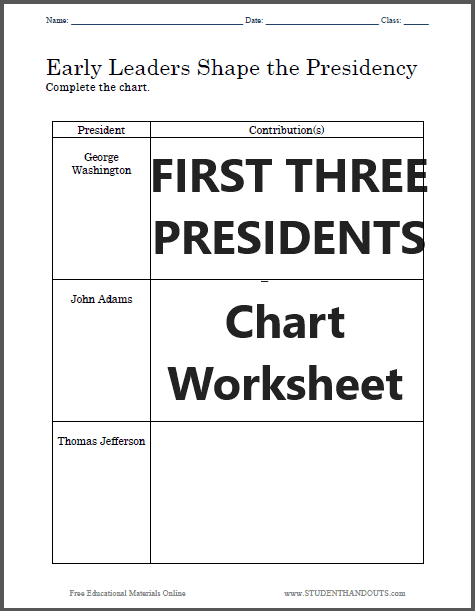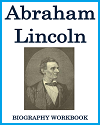| Early Presidents Chart Worksheet |
|---|
| www.studenthandouts.com ↣ U.S. History ↣ Forming a National Government ↣ Worksheets |
 |
    |
|
Students complete this chart, listing the contributions of the first three presidents--George Washington, John Adams, and Thomas Jefferson. Click here to print. Answers will vary. The presidency of George Washington (1789-1797) was foundational, establishing critical precedents for the new republic. Unanimously elected, he consciously defined the office's authority and dignity, creating a cabinet of advisors, including Alexander Hamilton and Thomas Jefferson. Washington's administration solidified federal power, overseeing the implementation of the Constitution, Hamilton's financial plan, and the suppression of the Whiskey Rebellion. His commitment to neutrality, articulated in his Proclamation of 1793, set a lasting foreign policy standard. Most importantly, he voluntarily stepped down after two terms, establishing the tradition of the peaceful transfer of power. His Farewell Address warned against political parties and permanent foreign alliances, leaving a lasting legacy of republican virtue and strong, limited executive leadership. The presidency of John Adams (1797-1801) was dominated by foreign policy crises and intense domestic political strife. As the nation's first one-term president, his Federalist administration struggled to maintain neutrality in the ongoing war between Britain and France. The XYZ Affair, a diplomatic insult from France, sparked an undeclared naval war known as the Quasi-War. Domestically, this tension led to the Alien and Sedition Acts, controversial laws designed to suppress criticism from the Democratic-Republican opposition led by Thomas Jefferson. These acts were widely denounced as unconstitutional and fueled the rise of the Jeffersonian party. Adams's legacy is mixed, defined by his preservation of peace but marred by the Sedition Act's assault on civil liberties. The presidency of Thomas Jefferson (1801-1809) marked a significant shift in government philosophy, which he called the "Revolution of 1800." A Democratic-Republican, he sought to decentralize power, reduce the size of the federal government, and cut taxes like the whiskey excise. Despite his principles of limited government, his most significant achievement, the Louisiana Purchase in 1803, dramatically expanded national territory and presidential power. His second term was plagued by foreign policy challenges, particularly the Embargo Act of 1807, an attempt to pressure Britain and France that instead crippled American commerce. Jefferson's legacy is thus a complex blend of republican ideals and pragmatic, powerful executive action. |
| www.studenthandouts.com ↣ U.S. History ↣ Forming a National Government ↣ Worksheets |














































